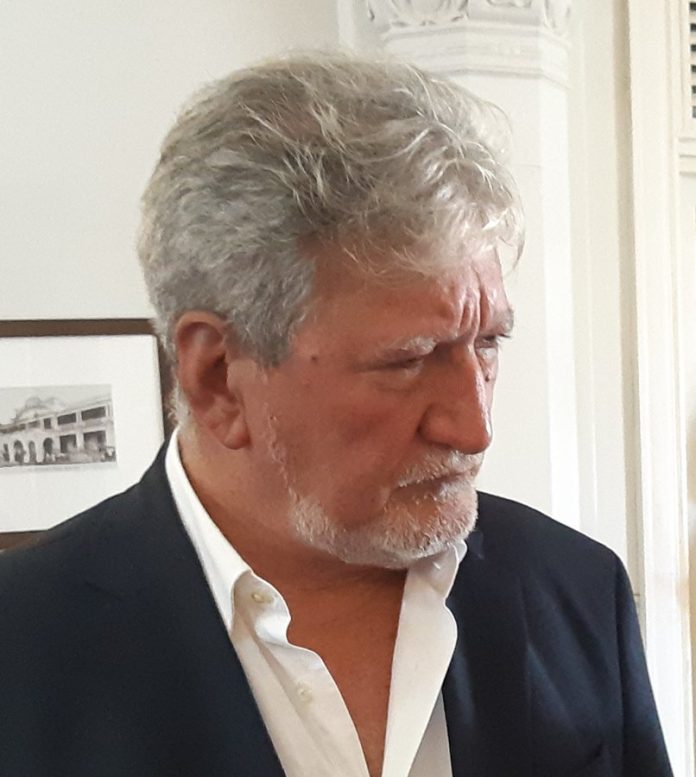By Nic Maclellan
For Jean-Christophe Bouissou, Vice President of French Polynesia, the 51st Pacific Islands Forum is an opportunity to highlight the ongoing challenge of climate change for the five archipelagos of Maohi Nui.
“A central focus of this week in Fiji is the climate risk and the impacts on the environment and biodiversity, as well as the impact on people’s livelihoods,” he said. “This is a global challenge, but it especially affects out countries that are especially vulnerable to sea level rise and extreme weather events like cyclones, flooding or landslides.”
In the absence of President Edouard Fritch, Bouissou leads French Polynesia’s delegation to the Forum leaders meeting, in its first face-to-face meeting since 2019.
A number of other presidents and prime ministers will be absent from Suva this week, facing elections, COVID surges or domestic crises. But the regional organisation has also been rocked by the announcement that President Taneti Maamau of Kiribati will withdraw from the Forum, dissatisfied by attempts to reconcile the concerns of the five members of the Micronesian Presidents’ Summit (MPS).
French Polynesia is an active member of the Polynesian Leaders Group (PLG), but Bouissou says the overall unity of the Forum must be maintained.
“We really want to see the 18 members consolidate their role in the Forum,” he said. “We have to talk with Kiribati about its intentions, even as we respect its sovereign decisions. We absolutely must preserve the unity of the Forum. Today, more than ever, we need to reach out our hand, so we can fight together on issues of concern.”
The centrepiece of this week’s summit is the launch of the new 2050 Strategy for a Blue Pacific Continent. French Polynesia – with a vast 5 million square kilometre Exclusive Economic Zone – sees ocean management as a central feature of economic, cultural and environmental policy.
Facing Chinese and European fishing fleets, Bouissou says “French Polynesia is a ‘good student’ when it comes to these issues – we’ve already decided to restrict foreign fishing fleets in our EEZ, to protect biodiversity and species of fish that are vital for our population as well as for export. We have to maintain sustainable fisheries, especially as European fishing fleets seek to exploit our waters.”
Seabed mining
Last month, Senator for French Polynesia Teva Rohfritsch presented a report to the French Senate as rapporteur of a fact-finding mission on the exploration and exploitation of seabed resources. French President Emmanuel Macron has announced hundreds of millions of euros for ocean research in the 11 million square kilometre EEZ claimed by the French state in its overseas dependencies.
But Bouissou told Islands Business that the time is not right for exploitation of seabed resources.
“For the Fritch government, the question of exploiting deep sea resources is not a priority. We have other focusses for development that are already under consideration in French Polynesia. There’s no need to act immediately. While you might explore for rare earths in the 5,000,000 square kilometre EEZ, the exploitation of these resources is a matter for future generations. There’s no need to run after new frontiers for exploitation.”
Moetai Brotherson is a member of the opposition Tavini Huiraatira party, newly re-elected to represent French Polynesia in the French National Assembly in Paris. Brotherson has joined a new regional coalition, the Pacific Parliamentarians’ Alliance on Deep Sea Mining (PPADSM), which is lobbying at this week’s Forum for a regional dialogue on the potential impacts of deep sea mining.
“There are many studies that show that most of the minerals in the French maritime area are in French Polynesia or Wallis and Futuna,” Brotherson said. “So tomorrow, it is very, very, very likely that France is going to come to our shores to exploit those minerals despite the known limitations of the technologies that we have today. This is why we want to regain our sovereignty, to be able to decide not to do this folly.”
Despite a 2004 autonomy statute giving powers over maritime resources to Papeete, France’s highest constitutional court has ruled that strategic metals come under the control of the French State rather than the Government of French Polynesia. Brotherson noted: “Our so-called statute of autonomy says we are in control of our deep sea minerals, with the notable exception of all strategic metals. But this list of strategic materials [sic] is being defined by Paris and Paris only.”
The pro-independence politician stresses that the idea France has “exclusive rights” over maritime resources is belied by successive resolutions of the UN General Assembly, that “natural resources are the heritage of the peoples of the Non-Self-Governing Territories, including the indigenous populations.”
Post-COVID recovery
Bouissou was appointed vice-president in November 2021, replacing Tearii Alpha, who resigned his post after refusing to be vaccinated against COVID-19. French Polynesia faced two major surges of COVID in the last two years, as it re-opened borders in July 2020, and following a four day tour by French President Emmanuel Macron in July 2021. By year’s end, French Polynesia had the highest per capita death rate from the virus of any Pacific island country or territory.
Bouissou says that the worst is over – for the moment – as tourism rebounds this year, and post-COVID recovery is on the regional agenda.
“We went through a very difficult situation, especially because the main economic sector in French Polynesia is tourism,” he told Islands Business. “So we were really hammered by COVID, as occurred elsewhere. However this year we’ve re-opened our borders, and you can already see a recovery in our business sector, and especially tourism. So now, we’re seeing a rebound of tourist arrivals above the levels seen in 2019. We’re very hopeful this will continue until the end of the year, as long as Europe doesn’t see new variants of the disease.”
SOURCE: ISLANDS BUSINESS/PACNEWS














